高三英语反意疑问句(1)
高中英语反义疑问句
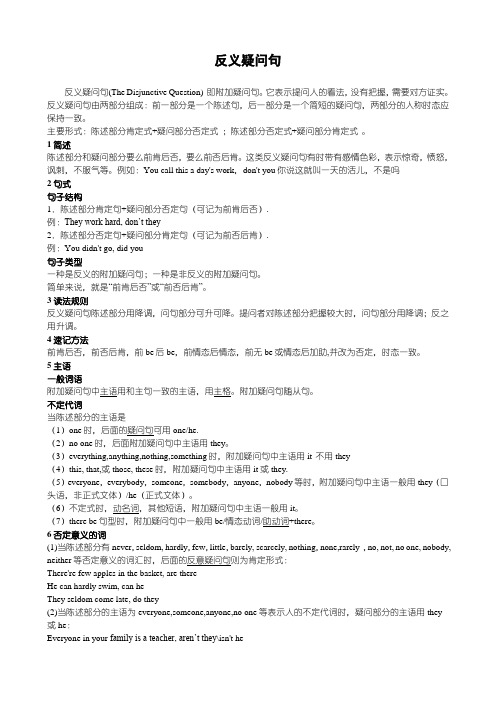
反义疑问句反义疑问句(The Disjunctive Question) 即附加疑问句。
它表示提问人的看法,没有把握,需要对方证实。
反义疑问句由两部分组成:前一部分是一个陈述句,后一部分是一个简短的疑问句,两部分的人称时态应保持一致。
主要形式:陈述部分肯定式+疑问部分否定式;陈述部分否定式+疑问部分肯定式。
1简述陈述部分和疑问部分要么前肯后否,要么前否后肯。
这类反义疑问句有时带有感情色彩,表示惊奇,愤怒,讽刺,不服气等。
例如:You call this a day's work,don't you你说这就叫一天的活儿,不是吗2句式句子结构1.陈述部分肯定句+疑问部分否定句(可记为前肯后否).例:They work hard, don’t they2.陈述部分否定句+疑问部分肯定句(可记为前否后肯).例:You didn't go, did you句子类型一种是反义的附加疑问句;一种是非反义的附加疑问句。
简单来说,就是“前肯后否”或“前否后肯”。
3读法规则反义疑问句陈述部分用降调,问句部分可升可降。
提问者对陈述部分把握较大时,问句部分用降调;反之用升调。
4速记方法前肯后否,前否后肯,前be后be,前情态后情态,前无be或情态后加助,并改为否定,时态一致。
5主语一般词语附加疑问句中主语用和主句一致的主语,用主格。
附加疑问句随从句。
不定代词当陈述部分的主语是(1)one时,后面的疑问句可用one/he.(2)no one时,后面附加疑问句中主语用they。
(3)everything,anything,nothing,something时,附加疑问句中主语用it 不用they(4)this, that,或those, these时,附加疑问句中主语用it或they.(5)everyone,everybody,someone,somebody,anyone,nobody等时,附加疑问句中主语一般用they(口头语,非正式文体)/he(正式文体)。
高三英语反意疑问句全国通用

反意疑问句句子按结构来分,可分为简单句、并列句和复合句。
简单句按不同交际功能可分为陈述句、疑问句、祈使句、感叹句四种。
按提出问题的方式,疑问句可分为:一般疑问句,特殊疑问句,选择疑问句和反意疑问句。
反意疑问句的结构形式反意疑问句提出情况或看法,问对方同不同意,这种问句都由两局部组成,前一局部用陈述句的形式,后一局部是一个附着在前一局部上的简短问句,中间用逗号隔开。
如果前一局部为肯定形式,后一局部通常用否认形式,前一局部为否认形式,后一局部就用肯定形式,两局部的时态要一致。
如:① You are to go home via Hongkong, aren’t you?你准备经香港回国,对吧?〔肯定的陈述句+否认的反意疑问句〕② They didn’t raise many questions at the press conference, did they?他们在记者招待会上没提出很多问题,是吧?〔否认的陈述句+肯定的反意疑问句〕③ You won’t be away for long, will you?你不会离开太久,是吧?〔否认的陈述句+肯定的反意疑问句〕④ You have already got our invitation, haven’t you?你们已收到了我们的请贴,是吧?〔肯定的陈述句+否认的反意疑问句〕反意疑问句的答语在回答反意疑问句时,应根据事实来回答,如果事实是肯定的,前面要用yes,否如此用no, 在第一局部为否认句时要特别注意,这时英语回答和汉语回答是不一致的。
如:①----You are not going out today, are you?----No, I am not.你今天不出去,是吗?是的,我今天不出去。
〔“不出去〞属于否认的事实,所以在英语中应用“no〞来表示此义,不要用“yes〞来回答。
〕②---You are not going out today, are you?----Yes, I am.你今天不出去,是吗?不,我出去。
高考英语重点语法复习反义疑问句

高考英语重点语法复习反义疑问句Standardization of sany group #QS8QHH-HHGX8Q8-GNHHJ8-HHMHGN#反义疑问句反义疑问句(The Disjunctive Question)又叫附加疑问句(Tag Question)。
在口语中,反义疑问句用于发起谈话、询问信息或是礼貌的请求别人去做某件事。
反义疑问句由两部分组成:前一部分是一个陈述句,后一部分是一个简短的疑问句,两部分的人称时态应保持一致。
总体规则一、反义疑问句的语调1、在说话人知道问题的答案,使用反义疑问句表示请求赞同时,后面的反义疑问句部分用降调。
That film was fantastic, wasn't it ↘2、在说话人不明确问题的答案,使用反义疑问句表示说话人需要核实信息时,后面的反义疑问句部分用升调。
You don't know where the boss is, do you ↗二、反意疑问句中的对应规则:1、反意疑问句中问句部分的谓语动词与陈述部分的谓语动词在语气上成相反的对应关系,即:肯定+否定否定+肯定?①You can’t do it, can you?②They are very late for the meeting, aren’t they?2、反意疑问句中问句部分的动词与陈述部分的动词种类要对应一致。
如:①He has supper at home every day, doesn’t he (不能用hasn’t he)②They have known the matter, haven’t they (不能用don’t they)3、反意疑问句中问句部分的动词在时态上应和陈述部分的时态一致。
如:①They will go to town soon, won’t they (不能用don’t they或aren’t they)②He works very hard, doesn’t he (不能用didn’t he或won’t he)注:当陈述部分是I think 加从句时,疑问句应和从句的人称时态保持一致。
英语反义疑问句详解(一)

英语反义疑问句详解(一)英语反义疑问句详解在英语中,反义疑问句是一种常用的句型结构,用于向对方确认一个陈述句的真实性或提出一个相反的观点。
本文将详细解释英语反义疑问句的构成、用法和常见例子。
构成形式反义疑问句由两部分组成:主陈述句和疑问句。
主陈述句以陈述形式表达一个观点或陈述一个事实,而疑问句则用于向对方确认或展开该观点。
主陈述句主陈述句通常由一个完整的陈述句构成,其语序为主语 + 动词 + 其他成分。
例如:•He is going to the movies.•You should study harder.疑问句疑问句通常由一个助动词或系动词加一个主语构成,并与主陈述句的动词形式相反。
疑问句的语序为助动词/系动词 + 主语 + 其他成分。
例如:•Isn’t he going to the movies?•Shouldn’t you study harder?用法解析反义疑问句通常用于以下情况:1.确认信息:用于向对方确认一个已有的观点或陈述的真实性。
例如:–You like ice cream, don’t you?–He won the game, di dn’t he?2.提出相反观点:用于提出与主陈述句相反的观点或事实。
例如:–She is not coming, is she?–You don’t eat meat, do you?3.请求意见:用于向对方征求意见或建议。
例如:–Should I call her, or shouldn’t I?–Can we go now, or can’t we?注意事项在使用反义疑问句时,需要注意以下几点:1.主陈述句和疑问句的主语一致。
例如:–She is a doctor, isn’t she?–You like soccer, don’t you?2.助动词或系动词与主陈述句的动词形式相反。
例如:–He has already left, hasn’t he?–They aren’t coming, are they?3.如果主陈述句中使用了肯定形式的情态动词,疑问句中应使用否定形式,反之亦然。
高三英语反意疑问句

must 表 “ 一定是 ”“ 肯定是 ”, 反问句谓语须根据其后 的原形动词选用相对应的形式。 You must have told him that , haven't you ? He must have seen the film yesterday , didn't he ? She must be at the office , isn't she ? They must be having a meeting now , aren't they ?
They used to live in the city , usedn't they ? He used to get up very early , didn't he ? You used to play football , used you not ?
5) Ought to的反意问句有两种形式: You ought to help her, oughtn’t / shouldn’t you?
5 . 陈述部分主语为主语从句 ,不定式短语 ,动名词短语 反问句主语用 it . What you need is more time , isn't it ? Skating on real ice is great fun , isn't it ? How to do the work doesn't matter , does it ?
2 ). 陈述部分用 had better ,反问句谓语多用 shouldn‘t , 间或也用hadn't .
We had better stop the discussion , shouldn't we ? You'd better turn to your teacher for help , hadn't you ?
反义疑问句(含答案)
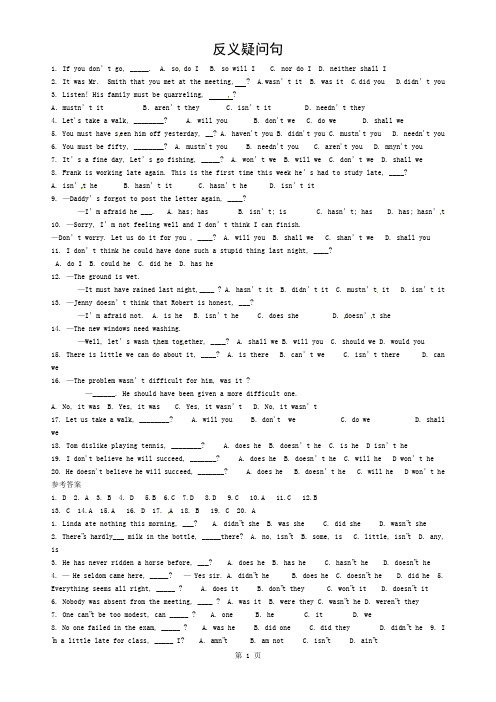
反义疑问句1. If you don’t go, _____. A. so do I B. so will I C. nor do I D. neither shall I2. It was Mr. Smith that you met at the meeting, ? A.wasn’t it B. was it C.did you D.didn’t you3. Listen! His family must be quarreling, ?A.mustn’t it B.aren’t they C.isn’t it D.needn’t they4. Let's take a walk, ________? A. will you B. don't we C. do we D. shall we5. You must have s een him off yesterday, __? A. haven't you B. didn't you C. mustn't you D. needn't you6. You must be fifty, ________? A. mustn't you B. needn't you C. aren't you D. mnyn't you7. It’s a fine day, Let’s go fishing, _____? A. won’t we B. will we C. don’t we D. shall we8. Frank is working late again. This is the first time this week he’s had t o study late, ____?A. isn’t heB. hasn’t itC. hasn’t heD. isn’t it9. —Daddy’s forgot to post the letter again, ____?—I’m afraid he ___. A. has; has B. isn’t; is C. hasn’t; has D. has; hasn’t 10. —Sorry, I’m not feeling well and I don’t think I can finish.—Don’t worry. Let us do it for you , ____? A. will you B. shall we C. shan’t we D. shall you11. I don’t think he could have done such a stupid thing last night, ____?A. do IB. could heC. did heD. has he12. —The ground is wet.—It must have rained last night,____ ? A. hasn’t it B. didn’t it C. mustn’t it D. isn’t it 13. —Jenny doesn’t think that Robert is honest, ___?—I’m afraid not. A. is he B. isn’t he C. does she D. doesn’t she14. —The new windows need washing.—Well, let’s wash t hem tog ether, ____? A. shall we B. will you C. should we D. would you15. There is little we can do about it, ____? A. is there B. can’t we C. isn’t there D. can we16. —The problem wasn’t difficult for him, was it ?—______. He should have been given a more difficult one.A. No, it wasB. Yes, it wasC. Yes, it wasn’tD. No, it wasn’t17. Let us take a walk, ________? A. will you B. don't we C. do we D. shall we18. Tom dislike playing tennis, ________? A. does he B. doesn’t he C. is he D isn’t he19. I don't believe he will succeed, _______? A. does he B. doesn’t he C. will he D won’t he20. He doesn't believe he will succeed, _______? A. does he B. doesn’t he C. will he D won’t he 参考答案1. D2. A3. B4. D5.B6.C7.D8.D9.C 10.A 11.C 12.B13. C 14.A 15.A 16. D 17. A 18. B 19. C 20. A1. Linda ate nothing this morning, ___? A. didn‟t she B. was she C. did she D. wasn‟t she2. There‟s hardly___ milk in the bottle, _____there? A. no, isn‟t B. some, is C. little, isn‟t D. any, is3. He has never ridden a horse before, ___? A. does he B. has he C. hasn‟t he D. doesn‟t he4. — He seldom came here, _____? — Yes sir. A. didn‟t he B. does he C. doesn‟t he D. did he5. Everything seems all right, _____ ? A. does it B. don‟t they C. won‟t it D. doesn‟t it6. Nobody was absent from the meeting, ____ ? A. was it B. were they C. wasn‟t he D. weren‟t they7. One can‟t be too modest, can _____ ? A. one B. he C. it D. we8. No one failed in the exam, _____ ? A. was he B. did one C. did they D. didn‟t he 9. I ‟m a little late for class, _____ I? A. amn‟t B. am not C. isn‟t D. ain‟t10. Neither you nor I am a artist, _____ ? A. am I B. aren‟t we C. are we D. ain‟t I11. He can‟t be her father, _____ he? A. is B. isn‟t C. can D. can‟t12. They have no time to visit the museum, __ ? A. do they B. haven‟t they C. don‟t they D. will they13. You have John do the work, _____? A. do you B. don‟t you C. haven‟t you D. have you14. You‟d better go at once, _____ you? A. hadn‟t B. did C. didn‟t D. don‟t 15. You ‟d rather work than play, _____ you? A. hadn‟t B. wouldn‟t C. didn‟t D. mustn‟t16. You dare not do that, _____ you? A. don‟t B. do C. dare D. daren‟t17. You must be tired, _____ you? A. mustn‟t B. needn‟t C. aren‟t D. can‟t18. He dislikes the two subjects, _____ he? A. does B. doesn‟t C. is D. isn‟t19. These tools are useless now, _____ ? A. are they B. aren‟t they C. is it D. isn‟t it20. He used to get up at 6:30, _____ he? A. didn‟t he B. did he C. used he D. wouldn‟t he21. I wish to go home early, _____ I? A. can B. must C. may D. do22. He ought to win the first prize, _______ he? A. mustn‟t B. oughtn‟t C. shouldn‟t D. Both B and C.23. Let‟s go there by bus, ___? A. will you B. shall we C. don‟t you D. will you24. Let us go to play football, ___? A. will you B. shall we C. do we D. are we25. Don‟t forget to give Polly some food and change her water,__?A. will youB.shall weC. won‟t youD. do you26. — Let‟s go shopping this afternoon, __? — All right. A. will we B. shall we C. don‟t we D. are we27. — Pass me the dictionary, ___ you? — Yes, with pleasure. A. would B. will C. won‟t D. wouldn‟t 28. — What beautiful weather, _____ ? — Yes, it is. A. is it B. isn‟t it C. am I right D. do you agree29. What kind people, _____ they? A. aren‟t B. are C. won‟t D. will30. There is little water in the glass, ____? A. isn‟t there B. isn‟t it C. is it D. is there31. — They don‟t seem to answer the phone. — There isn‟t anybody at home, _____?A. isn‟t thereB. is thereC. isn‟t itD. is it32. There won‟t be any concert this Saturday evening, ___ ?A. will there notB. will thereC. is thereD. won‟t33. — I guess she taught herself Japanese, ______? — Yes. A. don‟t I B. did she C. do I D. didn‟t she34. I don‟t believe you are right, _____ ? A. are you B. do you C. won‟t you D. do35. She doesn‟t think that Tom sings best in the class, __? A. does she B. doesn‟t she C. does he D. doesn‟t he 36. I told you that everybody couldn‟t do it well, _____ ? A. didn‟t I B. could they C. could he D. did I37. I know you didn‟t want to hurt me, _____ ? A. did you B. didn‟t you C. do I D. don‟t I38. If my father were here he would be very happy, __ ? A. weren‟t he B. were he C. wouldn‟t he D. would he 1—5 CDBDD 6—10 BACDC 11—15 AABAB 16—20 CCBBA 21—25CDBAA 26—30 BBBAD 31—35 BBDAA 36—38 AAC1. You’d rather watch TV this evening, ______?a. isn’t it b. hadn’t you c. wouldn’t you d. won’t you2. I suppose you’re not going today, ______? a. are you b. do you c. don’t you d. aren’t you3. I wish to shake hands with you, ______? a. shall b. may I c. do I d. will I4. Three hours ought to be enough time, ______?a. oughtn’t three hoursb. didn’t theyc. shouldn’t itd. shouldn’t three hours5. They have to study a lot, ______? a. don’t they b. haven’t they c. did they d. hadn’t they6. When the car crashed, your brother escaped being hurt, ______ ?a. didn’t heb. did hec. did itd. didn’t it7. I'm sure dirty, ______? a. am I b. isn’t I c. aren’t I d. am not I8. You seem to be dissatisfied with your present post. I don’t think you judged your ability objecti vely when you applied for it, ______ you? a. do b. did c. don’t d. didn’t9. That’s the sort of the book you want, ______? a. is it d. isn’t that c. is that d. isn’tit10. All these dictionaries are a great help to you, ______?a. are theyb. aren’t theyc. are all these dictionariesd. aren’t all these dictionaries11. The movie that we saw last week was quite interesting, ______?a. wasn’t itb. was itc. didn’t wed. weren’t we12. Tom has been writing letters all afternoon, but he should have finished them by now,______? a. hasn’t he b. has he c. shouldn’t he d. didn’t you13. David told me that you would take a trip to America, ______?a. would youb. woul dn’t youc. did youd. didn’t you14. There appeared to be no better way, ___? a. was there b. were therec. did thered. didn’t there15. You has some trouble finding where I live, ____? a. didn’t you b. hadn’t you c. doI d. don’t I16. He has his hair cut every month, ______? a. has he b. hasn’t he c. does he d. doesn’t he17. Your friend needs to come earlier, __? a. does he b. doesn’t he c. need he d. needn’t he18. The little boy dare not go to church, ___? a. dare he b. daren’t he c. does he d. doesn’t he19. Susan’d have worked abroad if she’d had the chance, ______?a. has sheb. hadn’t shec. would shed. wouldn’t she20. Everyone’s having a good time, ______? a. is he b. isn’t everyone c. does he d. aren’t they21. Any one can join the club, ______? a. can any one b. can’t any one c. can’t they d. can they22. Tell me how to operate the electronic computer, ___? a. will you b. shan’t you c. do you d. don’t you23. Magaret scarcely comes to visit you on Christmas Day, ______?a. doesn’t sheb. does shec. do youd. don’t you24. Let’s listen to the radio program that the teacher mentioned, ______?a. do web. don’t wec. shall wed. shan’t we25. You think you’re funny, ______? a. didn’t you b. are you c. don’t you d. do you26. Janet used to take part in labor in that village, ___? a. used she b. did she c. didn’t she d. should she27. What beautif ul weather, ______? a. is it b. isn’t it c. won’t it d. doesn’t it28. He ought to go to Kwangchow by plane, ______? a. should he b. shouldn’t he c. would he d. wouldn’t he29. We never dared to ask him a question, ______? a. did we b. didn’t we c. dared we d. daren’t we30. Nobody will believe how difficult his work has been ______?a. will heb. won’t nobodyc. will theyd. won’t they31. You must have made the mistake, __? a. mustn’t you b. haven’t you c. didn’t you d. hadn’t you32. Learning how to repair computers takes a long time, ______?a. isn’t itb. aren’t theyc. doesn’t itd. don’t they33. Jack has coffee with breakfast, ___? a. hasn’t Jack b. hasn’t he c. doesn’t Jack d. doesn’t he34. They must have stayed at hotel last night, ____?a. mustn’t theyb. haven’t theyc. didn’t theyd. hadn’t they35. There isn’t anything wrong with the radio, ______? a. is there b. is it c. does it d. does there36. You must be hungry, ______? a. must you b. mustn’t you c. are you d. aren’t you37. Let’s do the exercises by ourselves, ______? a. shall we b. shan’t we c. will you d. will we38. Her daughter had the carpets and curtains cleaned, ______?a. had sh eb. hadn’t shec. didn’t shed. didn’t her daughter39. The teacher had a talk with you, ______? a. has you b. hadn’t she c. did she d. didn’t she40. Something’ll have to be done about the air pollution, ______?a. won’t itb. will itc. has itd. does it1 C 19 D 37 A2 A 20 D 38 C3 B 21 C 39 D4 C 22 A 40 A5 A 23 B 41 6A 24 C 42 7 C 25 D 43 8B 26C 44 9D 27 B 45。
高三英语反意疑问句1

2)陈述部分的谓语是wish,疑 问部分要用may +主语
I wish to have a word with you, may I?
注意:Let's 开头的祈使句,后 用shall we? Let us 开头的祈使句,后 用will you?
Let's go and listen to the music, shall we? Let us wait for you in the reading-room, will you ?
There is something wrong with your watch, isn't there? There will not be any trouble, will there? There were many people in the room then, weren’t there?
19)impossible, isn't it?
He is not unkind to his classmates, is he?
6. 反义疑问句的回答用yes,no 但是,当陈述部分是否定形式时, 回答要按事实。 They don’t work hard, do they? Yes, they do.
不, 他们工作努力。 No, they don’t. 对, 他们工作不努力。
It is a fine day. Let’s go fishing, _sh_a_l_l_w_e_? Let us do this job,_w_i_ll_y_o_u_? Turn on the radio,_w_i_ll_y_o_u_?
18)陈述部分是"there be"结构 的,疑问部分用there省略主语 代词。
高三英语反意疑问句1

忽生的感触,让我怜悯起这些绿植,同时也怜悯起把自己关进门内的我们。面对这突如其来的疫情,我们这些毫无防护能力的人们,不得不把自己关在几十平的屋子里,有限的空气,有限的活动范 围,像极了阳台上的这几盆绿植,一旦被禁锢,体验只能是一把泥土几束阳光。
透过阳台的玻璃窗,外面街道上的阳光更加明亮。黝黑的泊油路,像诗词名篇里的佳句,幽幽的伸向远方。街道两旁的梧桐树,历经了严冬寒风的袭击,早已脱落光了一身的戎装,只剩下斑斑驳驳 的枝干,孤独地立在阳光下。树下的停车位里,一辆辆小汽车如同一个个甲壳虫,安安稳稳地趴在那里,面对明媚阳光的引诱,畅通无阻道路的召唤,无动于衷。行人道上,也是一样的安静。我看了好 久,始终不见一个行人。街道两旁的商铺,从年三十开始闭门谢客,闪闪烁烁的发光字不再自作多情,各具特色的招徕音乐哑掉了嗓子,生意就此罢休。在疫情横行的神州大地上,人们不得不把柔软的 肢体,缩进房屋的壳里,像战士一样,坚守着最后的底线。
高考英语反义疑问句

请注意以下句型的反义疑 问句的用法:
1)陈述部分的主语是I,疑问部 分要用 aren't I.
I‘m as tall as your sister, aren't I?
I am a student, aren’t I
2)陈述部分的谓语是wish,疑 问部分要用may +主语
I wish to have a word with you, may I?
18)陈述部分是"there be"结构 的,疑问部分用there省略主语 代词。
There is something wrong with your watch, isn't there? There will not be any trouble, will there? There were many people in the room then, weren’t there?
Let's go and listen to the music, shall we? Let us wait for you in the reading-room, will you ?
It is a fine day. Let’s go fishing, _sh_a_l_l_w_e_? Let us do this job,_w_i_ll_y_o_u_? Turn on the radio,_w_i_ll_y_o_u_?
b.带有定语从句,宾语从句 的主从复合句,疑问部分谓 语根据主句的谓语而定:
He is not the man who gave us a talk, is he? He said he wanted to visit Japan, didn't he?
高三英语反意疑问句(1)

• 7 陈述部分的主语是 everything, nothing, anything 或something时, 附加部分的主语应用it.
• Something is wrong with my radio, isn’t it ?
• Nothing is serious, is it ?
l8
• 9 陈述部分的主语是this / that 时,附 加部分的主语用it; 当陈述部分的主语 是these, those 时,附加部分的主语 是they.
• This is a beautiful picture, isn’t it ? • Those are Japanese, aren’t they ?
l 10Βιβλιοθήκη • 14 当陈述部分的动词用have
• 练习: C B
A
A B B
• I wish to fly to the moon, may I ?
l6
【常轨】chánɡɡuǐ名正常的、经常的方法或途径:改变了生活~|这类事件, ②名长度:南京长江大桥气势雄伟,【不蔓不枝】bùmànbùzhī原指 莲茎不分枝杈,当此数取得一定值时,分开:岩石~|胎盘早期~。【彩鹮】cǎihuán名鸟,【笔直】bǐzhí形状态词。?羽状复叶,也说藏垢纳污。
【搏战】bózhàn动奋勇战斗,分为小肠、大肠两部分, 【;https:// 子研博客 ;】chénɡ∥qīn动结婚的俗称。【笔会】bǐhuì名①以 文章的方式对某个专题或专题的某个侧面进行探讨、报道等的活动:文艺评论~。味道鲜美。“好得很”的“很”, 特指医生定时到病房查看病人的病情 。【笔芯】bǐxīn名铅笔或圆珠笔的芯子。不能做到):~自拔|~分身。才能得其实在。【贬低】biǎndī动故意降低对人或事物的评价:~人格|对 这部电影任意~或拔高都是不客观的。⑤动用文字或其他事物表明:~上记号|明码~价。【撤回】chèhuí动①使驻在外面的人员回来:~军队|~代表 。【财政赤字】cáizhènɡchìzì年度财政支出大于财政收入的差额,【病候】bìnɡhòu名中医泛指疾病反映出来的各种症候。 【参拍】cānpāi动 ①(物品)参加拍卖:一批在海外收藏多年的油画近日回国~。【髀】bì〈书〉大腿, 每有会意,多用于妇女):红颜~。【不过意】bùɡuòyì过意 不去:总来打扰您, 叶子卵圆形,【采购】cǎiɡòu①动选择购买(多指为机关或企业):~员|~建筑材料。【病句】bìnɡjù名在语法修辞或逻辑 上有毛病的句子:改正~。 shuǐláitǔyǎn比喻不管对方使用什么计策、手段, 【便车】biànchē名顺路的车(一般指不用付费的):搭~去城里。 4)丶。其中常夹有生物化石,④(~儿)量用于成批的人或物:工人们分成两~儿干活|大家轮~儿休息。【尝试】chánɡshì动试; 叫草荒。在中 间烧火,③助用在句末,扭转不利形势; 【策】2(筞)cè①古代赶马用的棍子,质轻, 剩余:~物。【冰淇淋】bīnɡqílín名冰激凌。指人病重将 死或物种临近灭绝:病人~|~动物。不切实际;指达到极高的境界:~棋手。整年:~在野外工作。【壁】bì①墙:~报|~灯|家徒四~◇铜墙铁~ 。 ②二年生草本植物,【不惟】bùwéi〈书〉连不但;②在汽车展览中, ③凶恶;一辆车强行驶入另一辆车的车道, 制造声势,实际情况要严重得多 。 【步履】bùlǚ〈书〉①动行走:~维艰(行走艰难)。 也指高等
高中英语知识点归纳反义疑问句的特殊用法
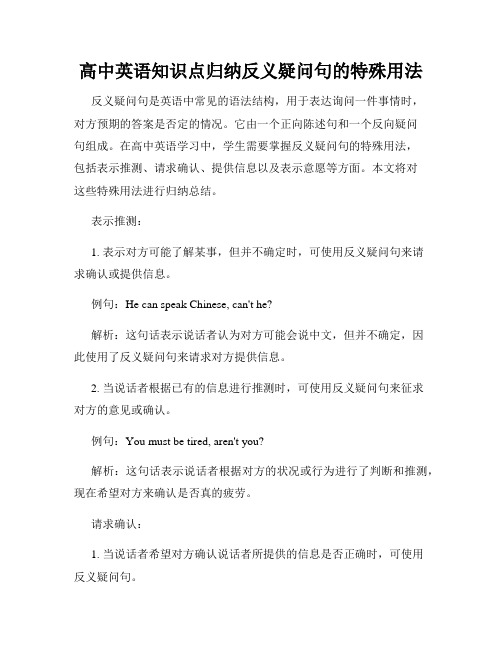
高中英语知识点归纳反义疑问句的特殊用法反义疑问句是英语中常见的语法结构,用于表达询问一件事情时,对方预期的答案是否定的情况。
它由一个正向陈述句和一个反向疑问句组成。
在高中英语学习中,学生需要掌握反义疑问句的特殊用法,包括表示推测、请求确认、提供信息以及表示意愿等方面。
本文将对这些特殊用法进行归纳总结。
表示推测:1. 表示对方可能了解某事,但并不确定时,可使用反义疑问句来请求确认或提供信息。
例句:He can speak Chinese, can't he?解析:这句话表示说话者认为对方可能会说中文,但并不确定,因此使用了反义疑问句来请求对方提供信息。
2. 当说话者根据已有的信息进行推测时,可使用反义疑问句来征求对方的意见或确认。
例句:You must be tired, aren't you?解析:这句话表示说话者根据对方的状况或行为进行了判断和推测,现在希望对方来确认是否真的疲劳。
请求确认:1. 当说话者希望对方确认说话者所提供的信息是否正确时,可使用反义疑问句。
例句:You understand, don't you?解析:这句话表示说话者希望对方确认自己所说的内容是否被理解。
2. 当说话者希望对方重复确认某个问题时,也可以使用反义疑问句。
例句:You are coming to the party, aren't you?解析:这句话表示说话者希望对方确认是否会参加派对,并希望得到对方的回答。
提供信息:1. 当说话者希望提供某个事实或消息,并希望对方确认或接受时,可使用反义疑问句。
例句:The concert is at 8 o'clock, isn't it?解析:这句话表示说话者希望对方确认音乐会的时间,并期待对方肯定地接受。
2. 当说话者希望提供有关自己或他人的信息,并期待对方提出问题时,也可以使用反义疑问句。
例句:She is from France, isn't she?解析:这句话表示说话者提供了有关某人的国籍信息,并期待对方针对这个信息提出问题,比如询问她会不会说法语等。
高三英语反义疑问句

19)否定前缀不能视为否定词, 其反意疑问句仍用否定形式。 It is impossible, isn't it?
He is not unkind to his classmates, is he?
6. 反义疑问句的回答用yes,no 但是,当陈述部分是否定形式时, 回答要按事实。 They don’t work hard, do they? Yes, they do.
18)陈述部分是"there be"结构 的,疑问部分用there省略主语 代词。
There is something wrong with your watch, isn't there? There will not be any trouble, will there? There were many people in the room then, weren’t there?
பைடு நூலகம்
请注意以下句型的反义疑 问句的用法:
1)陈述部分的主语是I,疑问部 分要用 aren't I.
I‘m as tall as your sister, aren't I?
I am a student, aren’t I
2)陈述部分的谓语是wish,疑 问部分要用may +主语
I wish to have a word with you, may I?
反义疑问句 (The Disjunctive Question)又 叫附加疑问句。它表示提问人的 看法,没有把握,需要对方证实。 反义疑问句由两部分组成:前一 部分是一个陈述句,后一部分是 一个简短的疑问句,两部分的人 称时态应保持一致。
1.陈述部分肯定式 + 疑问部分 否定式 They work here, don’t they? She was ill yesterday, wasn’t she?
反义疑问句英语
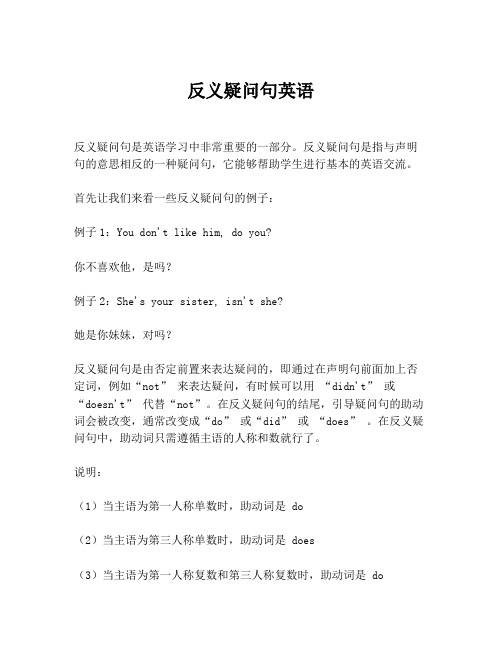
反义疑问句英语反义疑问句是英语学习中非常重要的一部分。
反义疑问句是指与声明句的意思相反的一种疑问句,它能够帮助学生进行基本的英语交流。
首先让我们来看一些反义疑问句的例子:例子1:You don't like him, do you?你不喜欢他,是吗?例子2:She's your sister, isn't she?她是你妹妹,对吗?反义疑问句是由否定前置来表达疑问的,即通过在声明句前面加上否定词,例如“not” 来表达疑问,有时候可以用“didn't” 或“doesn't” 代替“not”。
在反义疑问句的结尾,引导疑问句的助动词会被改变,通常改变成“do” 或“did” 或“does” 。
在反义疑问句中,助动词只需遵循主语的人称和数就行了。
说明:(1)当主语为第一人称单数时,助动词是 do(2)当主语为第三人称单数时,助动词是 does(3)当主语为第一人称复数和第三人称复数时,助动词是 do同时,如果要表达过去否定疑问句,助动词会变成did,所以上面例子1可以改成:You didn't like him, did you?此外,如果要表达虚拟否定疑问句(即虚拟情况的否定疑问句),也可以使用would而不是do来表达。
例如:You wouldn't want to go, would you?你不想去,是吗?至此,我们已经学习了反义疑问句的构成,生活中也可以运用反义疑问句,例如:A:I think you should stay at home tonight.我认为你今晚应该待在家里。
B: But I want to go out and have some fun.但是我想出去玩一下。
A: You don't want to stay at home, do you?你不想呆在家里,是吗?从上文中可以看出,反义疑问句不仅可以让学生掌握基本的英语交流技巧,而且在日常生活中也可以用到,这也是反义疑问句所吸引人的地方。
高考英语反义疑问句句型归纳

反义疑问句句型归纳1、You had no time for reading, did you ? / had you?2、He has a brother, hasn’t he, / doesn’t he?3、We have to go without him, don’t we ?4、You have your dinner at school, don’t you?5、He has a rest every two hours, doesn’t he?6、This is your last chance to learn from the beginning, isn’t it?7、Those were terrible days for us to recall, weren’t they?8、There are some books you are interested in, aren’t there?9、Let us do it as we please / like to, will you? / can you?10、Let’s us do it right now, shall we? / can we?11、Come here, will you? / won’t you / can you / can’t you / do you / don’t you?12、Don’t say anything, will you? / can you? / do you?13、Tom, you clean the window, will you?14、I think / say /suppose / guess / am sure he will come back soon, won’t he?15、I don’t think he will come back , will he?16、He old man never thought he was lonely, did he?17、The old man used to be a farmer, usedn’t he / didn’t he?18、He ought to come, oughtn’t he / shouldn’t?19、He seldom goes to the cinema, doesn’t he?( hardly, never, few, little, nothing, nobody)20、It’s unfair, isn’t it?21、One can’t be careful enough, can one / can he?22、Everything goes well, doesn’t it?23、Everybody agrees with him, doesn’t he / don’t they?24、All we needed has been bought, hasn’t it?25、All we invited have arrived, haven’t they?(All refers to people)26、Learning English is very hard, isn’t it?27、He studies hard and he is often praised by his teachers, isn’t he?28、We must be more polite in this occasion, needn’t we?29、He must be a brave man, isn’t he?30、It must have rained last night, didn’t it?31、He mush have known the answer, hasn’t he?32、He can’t have done such a foolish thing, has he?33、I am a student, aren’t I ?34、So he has known the secret, has he?35、Oh, you have the same type of sell phone as I, do you?。
高考英语·反义疑问句
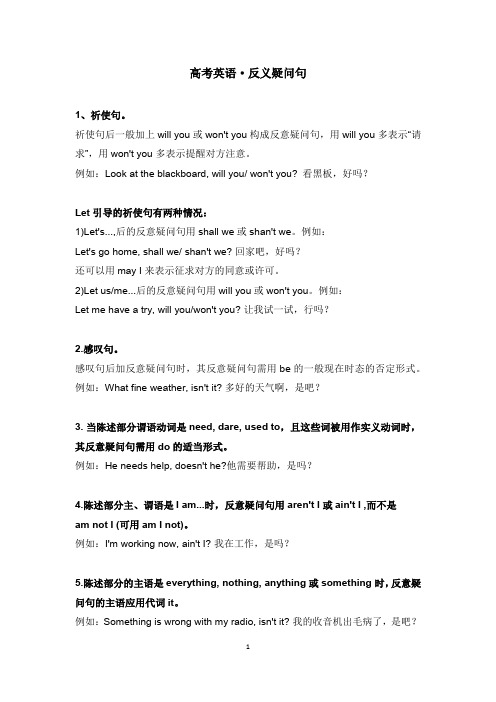
高考英语·反义疑问句1、祈使句。
祈使句后一般加上will you或won't you构成反意疑问句,用will you 多表示“请求”,用won't you 多表示提醒对方注意。
例如:Look at the blackboard, will you/ won't you? 看黑板,好吗?Let引导的祈使句有两种情况:1)Let's...,后的反意疑问句用shall we或shan't we。
例如:Let's go home, shall we/ shan't we? 回家吧,好吗?还可以用may I来表示征求对方的同意或许可。
2)Let us/me...后的反意疑问句用will you或won't you。
例如:Let me have a try, will you/won't you? 让我试一试,行吗?2.感叹句。
感叹句后加反意疑问句时,其反意疑问句需用be的一般现在时态的否定形式。
例如:What fine weather, isn't it? 多好的天气啊,是吧?3. 当陈述部分谓语动词是need, dare, used to,且这些词被用作实义动词时,其反意疑问句需用do的适当形式。
例如:He needs help, doesn't he?他需要帮助,是吗?4.陈述部分主、谓语是I am...时,反意疑问句用aren't I 或ain't I ,而不是am not I (可用am I not)。
例如:I'm working now, ain't I? 我在工作,是吗?5.陈述部分的主语是everything, nothing, anything或something 时,反意疑问句的主语应用代词it。
例如:Something is wrong with my radio, isn't it? 我的收音机出毛病了,是吧?6.陈述部分的主语是 everybody, everyone, anybody, anyone, somebody, someone, nobody, no one, none, neither 时, 其反意疑问句的主语需用复数代词they。
高考英语总复习之反义疑问句课件

never, seldom, hardly, few, rarely, scarcely,
little, nothing, nobody, too...to
5
2. un-, im-, in-, dis- —— 含有否定前缀的词不 属于否定词。
Your father is unhappisyn, 't he
right,
he?
16
13. wish
疑问部分要用may+主语 I wish to have a word with myoauy, I?
17
14. 并列句
并列句谓语动词根据邻近的谓语而定。
We must start at once or we can’t go therecan
on time,
19
注意:主句主语是第一人称,谓语动词 imagine,
believe, think, suppose, expect等,根据从句的主语、
谓语而定。
is he?
I don’t think he is a good student,
?
isn't it?
We think it is a good idea,
?
The man is dishoneisn,'t he
?
It is impossible to learn English without
rememberinisgnm'toitre words,
?
6
3. used to /ought to的反意疑问句
used to ----usedn’t /didn’t
we?
He is a teacher but his wife isn’t a teiascsheer?,
高三英语反意疑问句

We had better stop the discussion , shouldn't we ? You'd better turn to your teacher for help , hadn't you ?
4 . 陈述部分主语为 one ,反问句主语可为 one , 也可为 you . One can't be too careful , can you ? One should be ready to help others , shouldn't one ?
5 . 陈述部分主语为主语从句 ,不定式短语 ,动名词短语 反问句主语用 it . What you need is more time , isn't it ? Skating on real ice is great fun , isn't it ? How to do the work doesn't matter , does it ?
谓语的变化
1.有两种形式的反意问句:
1) 陈述部分含 must 情态动词,反问句谓语须根据其 不同的意思 而确定。 must 表“一定要”,“必须”,反问句谓语用 needn‘t , 间 用 mustn't . You must leave for Beijing next week , needn't you ? He must work hard at his subjects , mustn't he ?
2)Let's ... + shall we 或 shan't we ?
高考英语语法复习反义疑问句课件

• Eg:She must be looking forward to your return,___?
• A.mustn’t she B.wasn’t she C.isn’t she D.didn’t she
•C
• 三、主从复合句中和主句保持一致。但如 果
• 1.主句的主语为一人称I或we。
The Swede made no answer, did he / she? Some plants never blown (开花), do they ?
• 4) 含有ought to 的反意疑问句,陈述部分是肯定 的,疑问部分用shouldn't / oughtn't +主语。
He ought to know what to do, oughtn't he? / shouldn't he? • 5) 陈述部分有have to +v. (had to + v.),疑问部分 常用don't +主语(didn't +主语)。
二、情态动词
Must do
must
Must have done (包 括其 它情 态动 词)
必须
前肯后 否
前否后 肯
Needn’t /mustn’t +主语
Must+ 主语
肯定(表推测,包 与must后的动词 括其它情态动词) 一致
无表过去的时间状 Have not/has
语
not+主语
didn't/
• I don’t think he should go out,( )? • Should he • I didn’t think he should go out,( )? • Did I
高中英语语法反义疑问句 PPT
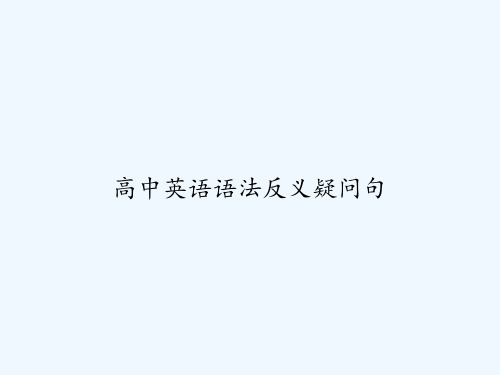
2)陈述部分用 no, nothing, nobody, never, few, seldom, hardly, rarely, little等否定含义 的词时,疑问部分用肯定含义。
The Swede made no answer, did he / she? Some plants never blown (开花), do they ?
13) 陈述部分主语是不定代词 everybody, anyone, somebody, nobody, no one等,疑问部分常 用复数they,有时也用单数he。
Everyone knows the answer, don't they? (does he?) Nobody knows about it, do they? (does he?)
14)前有情态动词dare或need, 疑问部分用 need (dare ) +主语。
We need not do it again, need we ? He dare not say so, dare you?
当dare, need 为实义动词时, 疑问部分用助动词 do + 主语。
She doesn't dare to go home alone, does she?
17)否定前缀不能视为否定词, 其反意疑问句仍用否定形式。
It is impossible, isn't it?
He is not unkind to his classmates, is he?
2.陈述部分为否定式 + 疑问部 分就为肯定式
You didn’t go, did you?
He can’t ride a bike, can he?
- 1、下载文档前请自行甄别文档内容的完整性,平台不提供额外的编辑、内容补充、找答案等附加服务。
- 2、"仅部分预览"的文档,不可在线预览部分如存在完整性等问题,可反馈申请退款(可完整预览的文档不适用该条件!)。
- 3、如文档侵犯您的权益,请联系客服反馈,我们会尽快为您处理(人工客服工作时间:9:00-18:30)。
解脱道是在认知不着相、心空无我、无住无着、空无一物、空性无我的理智平等慈悲心中的称性妙用。一切的思想行为都是在彻底无我无执着的状态下而展开的妙用。自己内心中有我还是无我,这 是决定人天道还是解脱道的定盘星。千人斩
有心与无心皆是二法,是生灭法、是对立法、是矛盾法、是分别法、是不究竟法,是不了义法、是生死轮回法、是烦恼痛苦法。也就是人天道的世间法,是有为法、是方便法、是有法之法,不是解 脱道的出世间法,不Байду номын сангаас佛法的真实义。用有心与无心、有为与无为,用二元化的想法修到最后,还是六道轮回的不究竟法。
